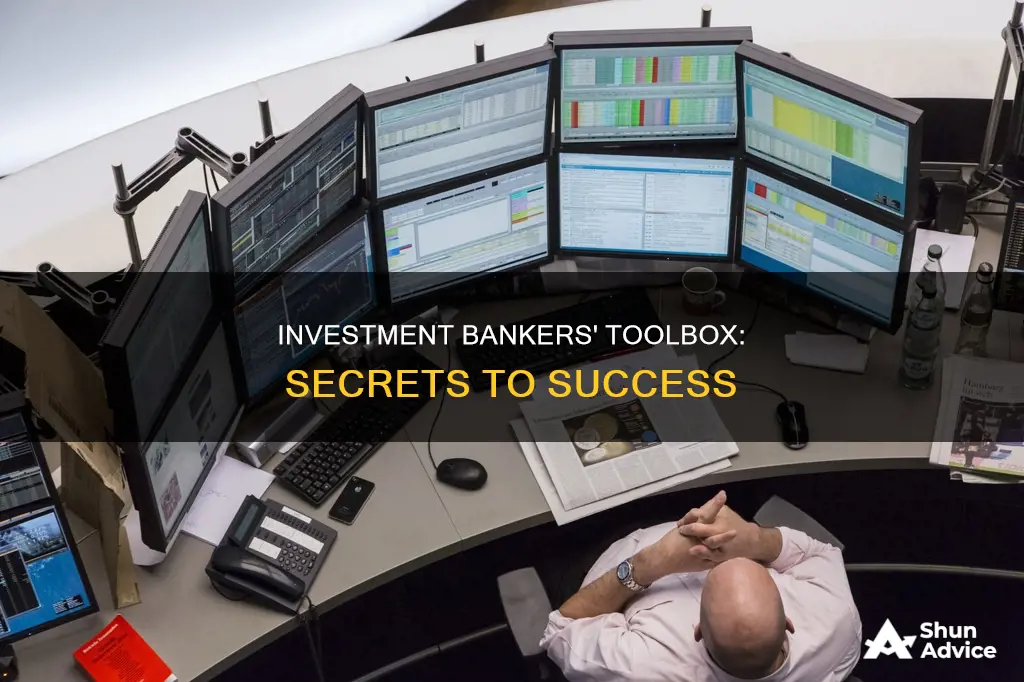
Investment bankers have a wide range of tools at their disposal to help them dissect complex market data, construct intricate financial structures, and navigate regulatory compliance. These tools are essential for staying competitive and efficient in the fast-paced world of finance. From financial modelling and analysis to client relationship management, investment bankers rely on technology to streamline their operations and make data-driven decisions.
In recent years, the focus has been on implementing the right technologies, innovations, and processes to improve efficiency, reduce costs, and maintain a competitive edge. While larger investment banks may develop tools in-house, most institutions will use a combination of software solutions to enhance their performance.
| Characteristics | Values |
|---|---|
| Data analytics | Financial modelling, risk assessment, portfolio optimisation, investment strategy development |
| Real-time collaboration | Chat functionalities, document sharing, version control |
| Financial modelling services | Pre-built templates, customisable formulas, scenario analysis capabilities |
| Strong security measures | Multifactor authentication, encryption, access controls |
| Deal management platforms | Virtual data rooms (VDRs) |
| Financial analysis and modelling tools | Capital IQ, Microsoft Excel, Bloomberg Terminal |
| Collaboration platforms | Slack, Microsoft Teams, Zoom |
| Client relationship management systems | Salesforce, Affinity, Pipedrive |
What You'll Learn

Virtual Data Rooms (VDR)
Virtual Data Rooms (VDRs) are an essential tool for investment bankers facilitating complex financial transactions. They are cloud-based repositories for storing, sharing, and organising large volumes of data and documents related to deals. VDRs are particularly useful for investment bankers during mergers and acquisitions (M&A), fundraising, strategic partnerships, and initial public offerings (IPOs).
Security and Data Protection
VDRs provide a highly secure environment for sharing sensitive information and confidential documents. They ensure data protection and reduce the risk of third-party information theft. VDR providers implement robust security protocols and comply with regulatory standards for privacy, data protection, and security. This includes certifications such as ISO 9001/ISO 27001, SOC 1/SOC 2, FISMA, FedRAMP, DIACAP, and SSAE 16.
Streamlining Due Diligence
VDRs play a crucial role in streamlining the due diligence process. They serve as a centralised hub for storing and accessing documents, eliminating the need for physical document review, which was time-consuming and inefficient. With all the relevant information in one secure online space, VDRs accelerate the due diligence process, enabling faster deal closures.
Collaboration and Transparency
VDRs enhance collaboration among stakeholders by providing seamless access to information. They facilitate the two-way flow of information, allowing for effective communication and transparency between investment bankers, buyers, sellers, and other parties involved in the deal. This increased collaboration improves efficiency and enables better decision-making.
Cost Efficiency
Compared to physical data rooms, VDRs offer a more cost-efficient solution. Physical data rooms incur additional expenses such as rent, staffing, and security. In contrast, VDRs typically operate on a subscription model, with monthly or annual payments, making it a more economical option.
Advanced Features
Investment bankers require VDRs with advanced features to support their deal-making process. These features include drag-and-drop and bulk file upload capabilities, specific permissions settings, and real-time analytics to track document views and user engagement. Watermarks and electronic leashes further enhance security and control.
Choosing a VDR Provider
When selecting a VDR provider, investment bankers should consider several factors. These include flat-rate billing, user-friendliness, fast document handling capabilities, detailed activity logs, and deal-specific features tailored to M&A transactions, fundraising, and IPOs. It is also essential to ensure the VDR provider complies with all relevant data security certifications and encryption protocols.
Is Your Cash App Investing Insured? Know the Facts
You may want to see also

Relationship Intelligence (RI) CRM Software
A purpose-built RI CRM platform can automate manual tasks such as data entry, allowing bankers to focus on relationship-building and client engagement. It also provides valuable insights into the strength of the team's collective networks, helping to identify warm introductions and the best path to prospective buyers or management teams. This ensures the team has a 360-degree view of the firm's relationships and keeps everyone on the same page.
RI CRM software also includes advanced analytics and reporting features, enabling bankers to make data-driven decisions and improve their performance. It offers customizable dashboards to monitor key metrics such as deal pipeline health, client engagement levels, and revenue forecasts. The advanced analytics provide deeper insights into trends, patterns, and performance metrics, helping bankers identify areas for improvement and forecast future trends.
Additionally, RI CRM platforms ensure compliance by systematically recording all transactions and interactions, making it easier for investment banking firms to adhere to industry regulations and respond to audits.
Some examples of RI CRM software include 4Degrees, Salesforce, HubSpot, Affinity, and Deal Cloud. Each platform offers unique features and capabilities to streamline the deal-making process for investment bankers.
Math in Finance: Investment Bankers' Secret Weapon
You may want to see also

Project Management Systems
Investment bankers can use relationship intelligence systems, such as 4Degrees, to manage the different stages of a deal and get real-time data on each transaction's progress and what still needs to be done. Other generic systems that can be used include Sharepoint and Microsoft Project, while smaller firms might opt for more lightweight app tools such as Asana and Trello.
A key function of project management systems is to facilitate collaboration between stakeholders. For example, virtual data rooms (VDRs) are used to securely store, organise and share financial, legal and other documents, especially during a transaction's due diligence process. VDRs also increase collaboration between deal stakeholders and improve transparency and accountability by tracking tasks and how much time is spent on specific items.
In addition to VDRs, collaboration software such as Slack, Yammer and Microsoft Teams are used by investment bankers to communicate and collaborate with team members and other stakeholders.
Cash Investments: Revenue or Not?
You may want to see also

Data Analytics and Financial Modelling Tools
Microsoft Excel is a popular choice for financial modelling, with its formulas, functions, pivot tables, and charts allowing bankers to manipulate and draw insights from large datasets. Excel is also used for financial analysis, such as running technical calculations, producing accounting ratios, and performing risk analysis.
Other tools in this category include Capital IQ, which provides comprehensive financial data and analytics on companies, markets, and economies, facilitating advanced financial modelling and analysis. Bloomberg Terminal is another powerful tool, offering market data, news, research, and real-time analytics. It is particularly useful for analysing large volumes of market data and accelerating decision-making.
For investment bankers, data analytics tools are crucial for financial modelling, risk assessment, portfolio optimization, and investment strategy development. These tools enable efficient analysis of large datasets, helping bankers make informed decisions about investment opportunities.
Artificial intelligence (AI) is also playing an increasingly important role in data analytics and financial modelling. AI-driven tools enable quantitative analysis, risk management, algorithmic trading, portfolio optimization, and predictive analytics. They streamline day-to-day operations, allowing investment bankers to make more informed and timely decisions.
Additionally, cloud-based data technologies are becoming essential in the investment banking industry. These technologies provide remote access to data and collaboration tools, enhancing efficiency and enabling bankers to work securely from anywhere in the world.
By leveraging data analytics and financial modelling tools, investment bankers can navigate complex market data, make informed decisions, and ultimately drive successful financial outcomes for their clients.
Extra Cash: Smart Investment Strategies for Beginners
You may want to see also

Collaboration Software
One of the most popular collaboration tools used by investment bankers is Slack, a cloud-based messaging platform. Slack allows users to create dedicated channels for specific topics, teams, or projects, enabling seamless communication and information sharing. It also offers instant messaging, audio and video calling, and file-sharing capabilities. Additionally, Slack integrates with various financial software and tools used by banks, streamlining workflows and reducing the need to switch between applications.
Another widely used collaboration platform is Microsoft Teams, which combines workplace chat, meetings, notes, and attachments, integrated with the Office 365 suite. Teams offers chat, video conferencing, file sharing, and seamless integration with other Microsoft Office applications. Investment professionals can create dedicated channels for specific deals or topics, enabling seamless information sharing and real-time collaboration. Teams also provides robust security features to ensure the confidentiality of sensitive financial data.
Zoom is another essential collaboration tool, particularly for virtual meetings, presentations, and discussions with clients, colleagues, and stakeholders worldwide. Zoom offers high-quality video and audio, screen sharing, and webinar capabilities, making it a valuable tool for effective collaboration.
While traditional tools like Excel are still mainstay in the industry, investment bankers can benefit from incorporating collaboration software into their workflows to enhance communication, improve efficiency, and ensure the smooth flow of transactions.
Outside Investment: Blessing or Cash Flow Curse?
You may want to see also
Frequently asked questions
Investment bankers use software tools to help with data analytics and financial modelling, such as Excel, Capital IQ, FactSet, and Bloomberg Terminal. Excel is used for creating complex financial models, performing valuation analyses, and data analysis. Capital IQ is a financial data platform that provides insights into companies, markets, and economies. FactSet provides financial data and analytics for global markets. Bloomberg Terminal is a comprehensive financial information and trading platform that provides market data, news, research, and real-time analytics.
Investment bankers use collaboration tools such as Slack, Microsoft Teams, and Zoom to communicate and collaborate with team members and clients. These tools allow for instant messaging, audio and video calls, file sharing, and integration with other work tools.
Client relationship management (CRM) systems help investment bankers to track and manage client relationships and interactions. Examples of CRM software used by investment bankers include Salesforce, HubSpot, Affinity, and Pipedrive. These platforms enable bankers to centralize client data, track interactions, manage leads, and monitor sales pipelines and activities.







